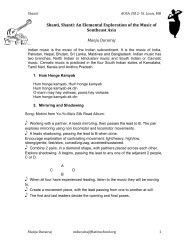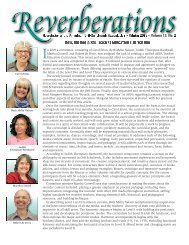ALICE S.PRATT WHEELS OF FREEDOM *PLEASE BRING NOTES ...
ALICE S.PRATT WHEELS OF FREEDOM *PLEASE BRING NOTES ...
ALICE S.PRATT WHEELS OF FREEDOM *PLEASE BRING NOTES ...
Create successful ePaper yourself
Turn your PDF publications into a flip-book with our unique Google optimized e-Paper software.
<strong>ALICE</strong> S.<strong>PRATT</strong><br />
<strong>WHEELS</strong> <strong>OF</strong> <strong>FREEDOM</strong><br />
<strong>*PLEASE</strong> <strong>BRING</strong> <strong>NOTES</strong> TO THE SESSION. IT IS A CRITICAL COMPONENT <strong>OF</strong><br />
THE PRESENTATION. Additional music will be posted ONLINE.<br />
aprattaosa@gmail.com<br />
This is a project that was done by several fifth and sixth grade students under my<br />
guidance. They wrote the narration and created melodies, lyrics, and ostinato for Orff<br />
instruments which I, as the master quilter, sewed together into a workable format. In<br />
addition, authentic songs, or artifacts, of our nation’s history of civil rights were included<br />
in the body of the story. **Additional music will be available on the online notes.<br />
Narrator 1: The School 16 Chorus proudly presents this tribute to Rosa Parks<br />
Songs: Intro- OH, ROSA! Song- Wheels of Freedom (p. 3, 4)<br />
Narrator 2: As the song tells us, Rosa woke up one morning with her mind stayed on freedom.<br />
It was that desire that drove her to one of the bravest actions of any American.<br />
SONG: WOKE UP THIS MORNING (p.6)<br />
Narrator 3: Rosa Parks was a great woman who stood up for what she believed was right. She,<br />
in her quiet way, fought for the freedom that all people deserved. In those days, it was a hard life<br />
for both blacks and women. Neither group was always treated fairly and was denied the equal<br />
rights that all Americans were to have. Rosa overcame both difficulties by a simple bus ride.<br />
Narrator 4: Rosa was born in 1913 in the state of Alabama. There was a law that discriminated<br />
against blacks that said that blacks must sit in the back of a public bus. The back was<br />
uncomfortable because the ride was bumpy and often smelled horribly from the bus fumes.<br />
There were other things that were not fair. For example, the water fountains were separated for<br />
blacks and whites. The one for black people was not clean and was dirty and rusty. Separating<br />
people is called segregation.<br />
Narrator 5: Rosa was coming home from a long day of work and she boarded the bus. She sat<br />
down in a seat near the front of the bus. The bus driver told her to get up because a white person<br />
needed a seat. He said,<br />
Chorus: “MOVE TO THE BACK <strong>OF</strong> THE BUS!” (p.4)<br />
Song (interlude): MOVE TO THE BACK <strong>OF</strong> THE BUS.<br />
Narrator 6: Rosa refused to get up out of her seat.<br />
Song: STAND UP FOR YOUR RIGHTS (melody of Move to the Back of the Bus, p.4)<br />
Narrator 7: Because she broke a law by refusing to give up her seat, Rosa was taken to jail.<br />
1
Song: JAIL, JAIL (p.5) (Note: this comes before Walk, Walk, error in notes)<br />
Narrator 8: Rosa was not alone. A great man named Martin Luther King Jr. heard about what<br />
happened and decided that it was time for a change.<br />
Optional Song: any song about Martin Luther King or the song We Shall Overcome may be<br />
used. We used The Dream of Martin Luther King by Merle Gartrell , arr. by Susan Van Dyck<br />
from Holidays: 21 Festive Arrangements, for Unchanged Voices and Orff Instruments;<br />
Memphis Musicraft Publications, 1980<br />
Narrator 9: Being a man who wanted peace, Martin convinced other black people with his<br />
commanding way of speaking to help him protest what happened to Rosa by not riding the bus<br />
instead of fighting about it. If the people stayed off the buses, the bus company would lose<br />
business and money and complain to the law makers.<br />
Narrator 10: This was hard on the people because it meant that they had to walk to work,<br />
church, stores, and to visit their family and friends. Yet, they were determined. They wrote<br />
signs that said,<br />
Chorus: People, don’t ride the bus today. Don’t ride the bus for freedom!<br />
Narrator 11: This is called a boycott. They knew it could work because the bus people would<br />
surely miss that money!<br />
Song: WALK, WALK (p.4) (NOTE: Jail, Jail is performed before Walk, Walk-out of order on<br />
sheet).<br />
Narrator 12: Victory was won and the laws were changed. As a result:<br />
Narrator 13: Black and white people could sit wherever they wanted<br />
Narrator 14: Bus drivers were to respect all people.<br />
Narrator 15: Blacks could even now drive a bus and earn money doing so.<br />
Song: MAKE AMERICA A BETTER PLACE (p. 5)<br />
Rosa Parks: I am the Mother of the Civil Rights Movement, Rosa Louise McCauley Parks. I<br />
hope that you learned something from my story. Remember to always treat people fairly and<br />
equally, and to stand up for your rights in appropriate ways, with the peace that Dr. King and I<br />
demonstrated.<br />
I received many awards for my bravery and courage. I received the Springarn Medal, the Martin<br />
Luther King Jr. Non-Violent Peace Prize, and the Eleanor Roosevelt Woman of Courage Award.<br />
I leave you with these words: “To this day, I believe we are here on the planet earth to live,<br />
grow up, and do what we can to make this world a better place for all people to enjoy freedom. “<br />
SONG: INTRO ONLY <strong>OF</strong> OH ROSA<br />
Immediately lead into: WE SHALL NOT BE MOVED (p. 7)/ WE SHALL OVERCOME<br />
2






